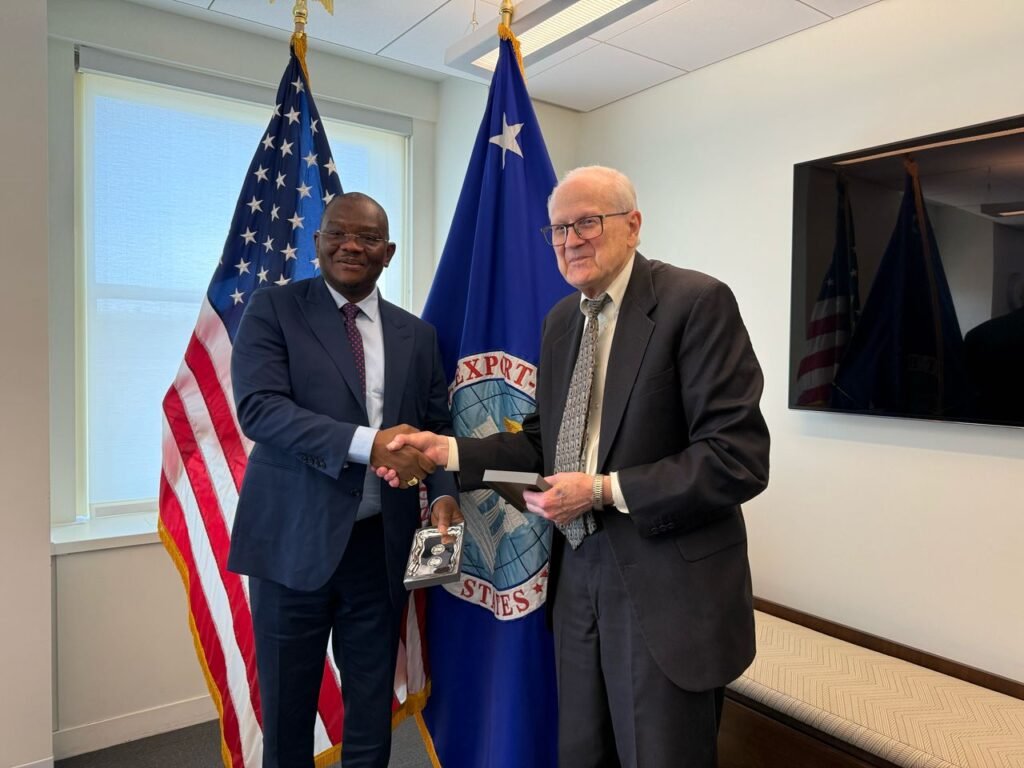Hot!
GSE donates GH₵100,000 to National COVID-19 Trust Fund

The Ghana Stock Exchange (GSE), has donated GH₵100,000 to the National COVID-19 Trust Fund to help fight the pandemic.
The donation which was made at a short ceremony at the Jubilee House was received by the Head of the Trust Fund, former Chief Justice, Sophia Akuffo.
The Head of Marketing and Public Relations at the GSE, Diana Okine who spoke at the event said even though the GSE was a non-profit making organisation, management felt it was prudent to support the nation in these difficult times.
According to her, the GSE saw it as an obligation to support a national fight which would result in the betterment of the health of the populace they engaged every day.
“This is a pandemic that affects everybody and our clientele is made up of the Ghanaian populace, so if the Ghanaian populace is health it means that we will have a good environment and we will have happy investors. The GSE although it is a non-profit making organisation, we are a public company limited by guarantee and therefore, we are in this fight like anybody else and we also see it prudent for us to help the government’s goal in making Ghana a healthy country by curbing this pandemic,” she said.
“There are other vulnerable people around, there are people who need help, there are people who are not wealthy but they all contribute to the stock exchange. In order to ensure that all these people are healthy and for the Ghanaian economy to be back on track, the GSE identified with the course and we made this donation,” Mrs Okine said.
Receiving it, former Chief Justice, Sophia Akuffo commended the GSE for the effort and assured of judicious use of the fund.
“There is an impression that the GSE is a money making, money spinners who are only interested in rich people who have money to invest. This will go a long way to dispel that impression people have. We are most grateful to the management, we are most grateful to the organisation itself,” she said.
The GSE recently donated GH₵150,000 to the Covid-19 Private Sector Fund to help in the construction of a 100-bed treatment and isolation facility at the Ga West Hospital in Accra.
Hot!
GEXIM deepens relations with US EXIM Bank

A management team of the Ghana Export – Import Bank (GEXIM) led by the Acting Chief Executive, Sylvester Mensah met with the leadership of the Export–Import Bank of the United States (US EXIM) on Wednesday April 23, 2025 in Washington DC, United States of America.
The Acting President and Chairman of US EXIM, Mr. James C. Cruse and Vice President, International Relations, Ms. Isabel Galdiz received the GEXIM delegation, which included Deputy CEO for Banking, Mr. Moses Klu Mensah and Head of International Cooperation, Mr. Jonathan Christopher Koney at the headquarters of US EXIM.

The meeting offered the GEXIM team the opportunity to share the strategic direction of the Bank in line with the resetting agenda of the President of the Republic, His Excellency John Dramani Mahama for the repositioning of the Ghanaian economy into an export-led one by providing the requisite investment to Ghanaian businesses.
Mr. James C. Cruse expressed US EXIM’s eagerness to deepen its existing relations with GEXIM and proposed the signing of a new Cooperative Framework Agreement following the expiration of a Memorandum of Understanding signed in 2019 to utilize US EXIM’s medium term loan guarantees to procure machinery by GEXIM for qualified Ghanaian Small and Medium-sized Enterprises (SMEs).
Mr.Sylvester Mensah thanked the Acting President and Chairman of US EXIM for hosting the GEXIM delegation and reaffirmed the Ghanaian government’s commitment to strengthening trade and investment between Ghana and its global partners for economic transformation of Ghana with GEXIM playing a pivotal role.
The two teams will be meeting on the sidelines of the 2025 US EXIM Annual Conference on 29th and April 30, 2025 to explore possible areas of collaboration and matching Ghanaian businesses to American companies. The meeting ended with an exchange of gifts.
Hot!
Many SOEs have been used as mere instruments for personal wealth accumulation –Pres.Mahama

President John Dramani Mahama has expressed concern over the misuse of State-Owned Enterprises (SOEs) for personal financial gain by individuals in leadership positions.
Speaking during a meeting with Chief Executives of specified entities under the State Interest and Governance Authority (SIGA) on Thursday, March 13, the President directly attributed the dire state of SOEs to their leadership, accusing chief executives, management teams, and governing boards of prioritising personal enrichment over organisational efficiency.
He pointed to bloated budgets, unjustified allowances, and unnecessary expenditures as factors draining public funds while SOEs continue to rely on government bailouts.
“Many SOEs have been used as mere instruments for personal wealth accumulation by appointees. The chief executives, management, and boards of these enterprises are responsible for this situation. Some SOEs have become perennial loss-makers, draining public funds with bloated budgets, unjustified allowances, and unnecessary expenditures while relying on government bailouts as if entitled to them. Many of these entities are at their lowest point in the entire history of the Fourth Republic,” he said.
President Mahama further noted that many SOEs have been plagued by inefficiencies, corruption, and mismanagement, leading to consistent financial losses. He cited the 2023 State Ownership Report by the State Interests and Governance Authority (SIGA), which highlighted systemic inefficiencies and wasteful expenditures within these entities.
He therefore reaffirmed his commitment to reforming under-performing SOEs and ensuring they serve national interests.
He warned that loss-making SOEs will no longer be tolerated and will either be merged, privatised, or closed.
“I will assess you based on your performance. If you do not align with the pace of the reset agenda, you may be asked to step aside. If that adds to the horror movie, so be it,” he added.
Source: Myjoyonline.com







